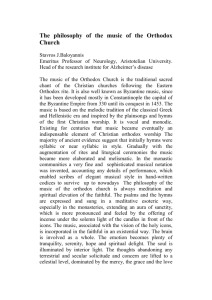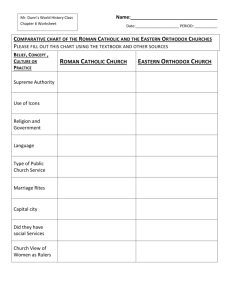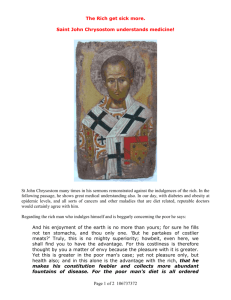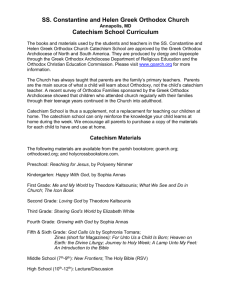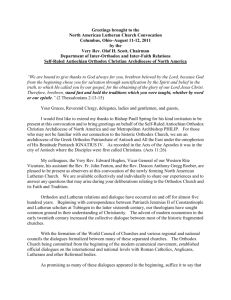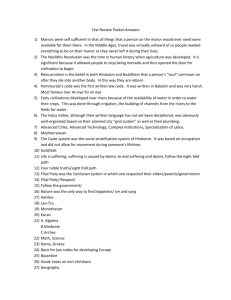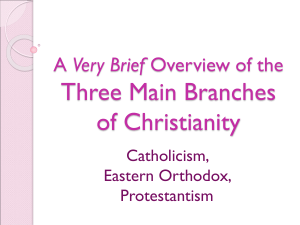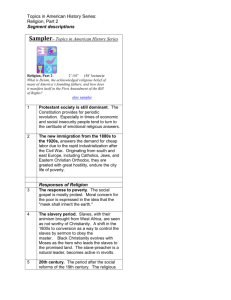The Church and Politics
advertisement
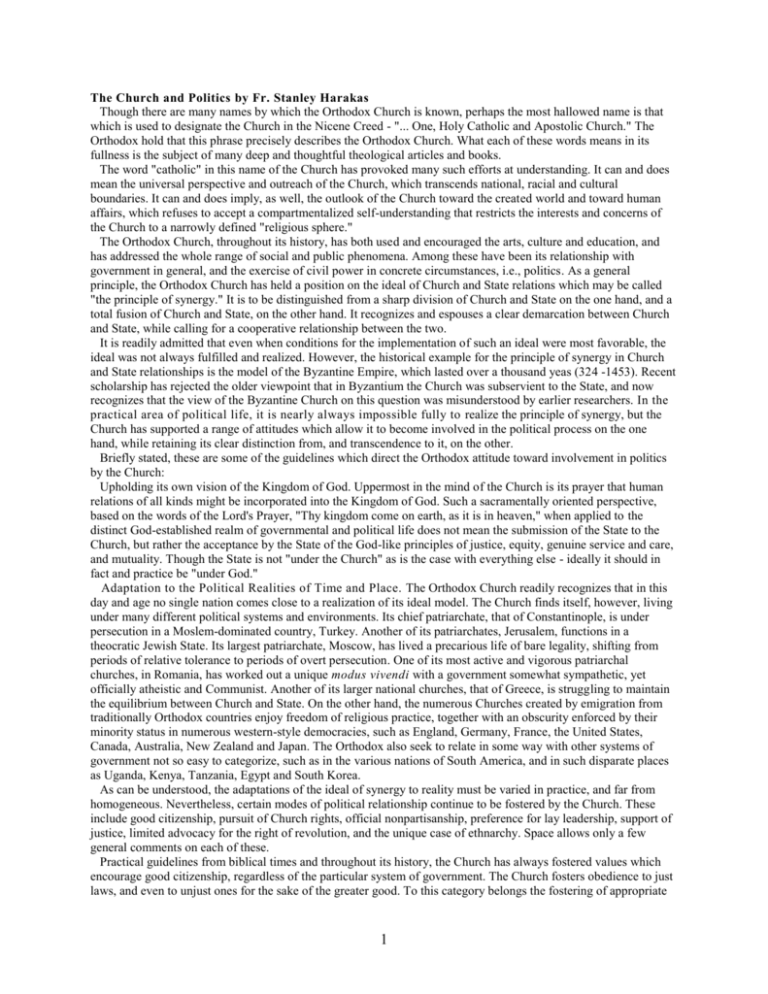
The Church and Politics by Fr. Stanley Harakas Though there are many names by which the Orthodox Church is known, perhaps the most hallowed name is that which is used to designate the Church in the Nicene Creed - "... One, Holy Catholic and Apostolic Church." The Orthodox hold that this phrase precisely describes the Orthodox Church. What each of these words means in its fullness is the subject of many deep and thoughtful theological articles and books. The word "catholic" in this name of the Church has provoked many such efforts at understanding. It can and does mean the universal perspective and outreach of the Church, which transcends national, racial and cultural boundaries. It can and does imply, as well, the outlook of the Church toward the created world and toward human affairs, which refuses to accept a compartmentalized self-understanding that restricts the interests and concerns of the Church to a narrowly defined "religious sphere." The Orthodox Church, throughout its history, has both used and encouraged the arts, culture and education, and has addressed the whole range of social and public phenomena. Among these have been its relationship with government in general, and the exercise of civil power in concrete circumstances, i.e., politics. As a general principle, the Orthodox Church has held a position on the ideal of Church and State relations which may be called "the principle of synergy." It is to be distinguished from a sharp division of Church and State on the one hand, and a total fusion of Church and State, on the other hand. It recognizes and espouses a clear demarcation between Church and State, while calling for a cooperative relationship between the two. It is readily admitted that even when conditions for the implementation of such an ideal were most favorable, the ideal was not always fulfilled and realized. However, the historical example for the principle of synergy in Church and State relationships is the model of the Byzantine Empire, which lasted over a thousand yeas (324 -1453). Recent scholarship has rejected the older viewpoint that in Byzantium the Church was subservient to the State, and now recognizes that the view of the Byzantine Church on this question was misunderstood by earlier researchers. In the practical area of political life, it is nearly always impossible fully to realize the principle of synergy, but the Church has supported a range of attitudes which allow it to become involved in the political process on the one hand, while retaining its clear distinction from, and transcendence to it, on the other. Briefly stated, these are some of the guidelines which direct the Orthodox attitude toward involvement in politics by the Church: Upholding its own vision of the Kingdom of God. Uppermost in the mind of the Church is its prayer that human relations of all kinds might be incorporated into the Kingdom of God. Such a sacramentally oriented perspective, based on the words of the Lord's Prayer, "Thy kingdom come on earth, as it is in heaven," when applied to the distinct God-established realm of governmental and political life does not mean the submission of the State to the Church, but rather the acceptance by the State of the God-like principles of justice, equity, genuine service and care, and mutuality. Though the State is not "under the Church" as is the case with everything else - ideally it should in fact and practice be "under God." Adaptation to the Political Realities of Time and Place. The Orthodox Church readily recognizes that in this day and age no single nation comes close to a realization of its ideal model. The Church finds itself, however, living under many different political systems and environments. Its chief patriarchate, that of Constantinople, is under persecution in a Moslem-dominated country, Turkey. Another of its patriarchates, Jerusalem, functions in a theocratic Jewish State. Its largest patriarchate, Moscow, has lived a precarious life of bare legality, shifting from periods of relative tolerance to periods of overt persecution. One of its most active and vigorous patriarchal churches, in Romania, has worked out a unique modus vivendi with a government somewhat sympathetic, yet officially atheistic and Communist. Another of its larger national churches, that of Greece, is struggling to maintain the equilibrium between Church and State. On the other hand, the numerous Churches created by emigration from traditionally Orthodox countries enjoy freedom of religious practice, together with an obscurity enforced by their minority status in numerous western-style democracies, such as England, Germany, France, the United States, Canada, Australia, New Zealand and Japan. The Orthodox also seek to relate in some way with other systems of government not so easy to categorize, such as in the various nations of South America, and in such disparate places as Uganda, Kenya, Tanzania, Egypt and South Korea. As can be understood, the adaptations of the ideal of synergy to reality must be varied in practice, and far from homogeneous. Nevertheless, certain modes of political relationship continue to be fostered by the Church. These include good citizenship, pursuit of Church rights, official nonpartisanship, preference for lay leadership, support of justice, limited advocacy for the right of revolution, and the unique case of ethnarchy. Space allows only a few general comments on each of these. Practical guidelines from biblical times and throughout its history, the Church has always fostered values which encourage good citizenship, regardless of the particular system of government. The Church fosters obedience to just laws, and even to unjust ones for the sake of the greater good. To this category belongs the fostering of appropriate 1 ethnic and cultural identification, the support of military service, and the defense of the nation. The Church has also encouraged public service on the part of citizens, and philanthropies for the general good. Traditionally, the Church understands that one of its chief rights before the State is freedom to worship and function as a Church. Therefore, one of its major concerns is to assure its freedom, and to restrict or eliminate what it views as the improper interference of the State in the life of the Church. Byzantine history has many examples of the Church opposing the policies of emperors who were considered to be improperly interfering in Church affairs. It must also be noted, however, that the Church often welcomed the involvement of the emperors when the Church judged that this involvement served its interests. By and large, the Church is content to let the various political processes function in a way which separates the Church from partisan politics by maintaining a stance of general non-partisanship. Regardless of the political system of the nation and government, the Church is prepared to pray for the leader, in accordance with New Testament teaching. In democracies, this means that the Church seeks, insofar as its other purposes allow, to avoid partisan politics, neither formally opposing nor endorsing political candidates. Historically, only officials who imposed heretical teachings on the Church, or persecuted the Church, might be personally condemned; but even in these cases there was a certain hesitancy. By and large, hierarchs and other clergy do not seek to exercise political power, with the exception of the exercise of "ethnarchy," a unique institution discussed below. The official Church strongly prefers that its laity be involved in government and politics, and embody Christian values to the extent possible given the governmental and political systems in force. This approach avoids the evils of a theocratic system, while encouraging a more general lay involvement in the embodiment of the ideal of the Kingdom of Heaven in Church-State relationships. The basic role of government is to provide protection and to ensure justice. The Church sees God as the source of justice; therefore, it shares His concern about justice within the State. In the political process, which seeks to embody justice, there are numerous means by which the Church has sought to further its concern for justice. In the ancient imperial system, churchmen had not only sought to form the character and conscience of the Emperor in general, but frequently "whispered in the ear of the emperor" with reference to specific issues. The Church was a force for the improvement of laws, "toward greater philanthropy." In present-day democratic societies Orthodox hierarchs, ecclesiastical bodies, and even individual Orthodox Christians, must often publicly protest injustice, participate in the legislative process, and use other political means to further political issues with moral implications. By and large, the Church approves stability of government and does not encourage revolution. Just as it recognizes the great evil in war, yet at times understands and accepts the need to wage war in defense of the homeland, so also, but even more reluctantly, does it accept the right to revolution in cases of severe and unbearable injustice. In most cases, the Church's support of revolutionary causes has been related to efforts of national independence. However, there is nothing in the tradition which would reject out of hand revolutions which are motivated by a sense of unbearably oppressive injustice in other spheres. Such concerns, as embodied in modern day "Liberation Theology" movements, have their antecedents in the writings of Church Fathers such as St. John Chrysostom, who railed against the exploitation of the poor by the rich. What the Orthodox Church finds unnecessary and unacceptable in "Liberation Theology" is the Marxist theoretical underpinnings of this theological movement. However, its concern for the downtrodden and the exploited is recognized to be essential Christianity. http://www.goarch.org/ourfaith/ourfaith7101 Political ethics, From OrthodoxWiki The field of political ethics examines three specific areas: 1.) Church-state relations, 2.) responsibilities of the state towards its people, and 3.) the responsibility of the people towards their state. Focusing on the political history of the Orthodox Church and taking an Orthodox Christian perspective, this article will primarily turn to Stanley S. Harakas for ethical commentary. Church-State Relations Harakas argues for four possible categories of Church-state relations:1 1. Separation of church and state. In this case, the state can be neutral, friendly, or antagonistic to the church. 2. Papocaesarism (theocracy). The church, or religious authority, is the government. 3. Caesaropapism. The church is governed by the state. 4. Symphonia theory. The church and state are complementary and exhibit mutual respect. Most countries today implement some sort of separation of church and state. Politics and governance as social institutions are viewed by Orthodox Christianity as part of the divine plan for humanity. In light of this, the primary goal of the Orthodox Church is to seek a cooperative position with the state. Emperor Justinian I expressed this position when he said, "A distinction is drawn between the imperial authority and the priesthood, the former being concerned with human affairs and the latter with things divine; the two are regarded as closely interdependent, but, 2 at least in theory, neither is subordinated to the other." 2 This statement embodies the "Harmony," "Concord" or Symphonia Theory, which has been generally characteristic of Orthodox thinking about the state and was historically set in place in the Christianized Roman Empire from 321-1453 A.D. and described by scholars as the Byzantine Empire. Such a position is scripturally based as evidenced in several Old Testament texts; the most notable references being that of Melchizedek the priest-king and the brotherly relationship between Aaron, the high priest, and Moses, the leader of Israel from Egypt. The Symphonia Theory upholds the ideal principles to which the Church and state should strive for. However, as modern history has shown, the modern state still has yet to make such an achievement of this ideal. Harakas states, "Today, there are almost no existing presuppositions for its implementation as a system of Church-state relations in our times. In no nation of the world today do the ideas of an active 'symphonia' principle and a committed 'symphonia political agenda' exist. At the least, the 'Symphonia Theory' of church-state relationships is nothing more than a fossil of antiquarian interest. At most, it presents 'an impossible ideal' in the contemporary world, which may illumine some attitudes for Orthodox Christians regarding their views of the well-ordered state as well as the relationship of the Church toward the state." 3 Within the vision of the Symphonia Theory, the Church encourages her members to take on political involvement in a healthy manner. She calls for her members to be good citizens, to be aware of the issue at hand, to make oneself informed, and to speak up on issues when the necessity arises. This way the voice of the Church is heard by the government and society. With Orthodox Christians involved in the political system, the Church has the capability of affecting the social conscience. Without effective Orthodox Christian thinkers and activists in the political structure, the Church is reduced to a mere spectator, forcing her to become disconnected with the world in which she resides. Responsibilities and Rights of the State The Orthodox Church has always stressed the responsibilities of the state towards its people. Taking a biblical standpoint, Romans 13: 1-7 clearly defines the responsibilities of the good state: "Everyone must submit himself to the governing authorities, for there is no authority except that which God has established. The authorities that exist have been established by God. Consequently, he who rebels against the authority is rebelling against what God has instituted, and those who do so will bring judgment on themselves. For rulers hold no terror for those who do right, but for those who do wrong. Do you want to be free from fear of the one in authority? Then do what is right and he will commend you. For he is God's servant to do you good. But if you do wrong, be afraid, for he does not bear the sword for nothing. He is God's servant, an agent of wrath to bring punishment on the wrongdoer. Therefore, it is necessary to submit to the authorities, not only because of possible punishment but also because of conscience. This is also why you pay taxes, for the authorities are God's servants, who give their full time to governing. Give everyone what you owe him: If you owe taxes, pay taxes; if revenue, then revenue; if respect, then respect; if honor, then honor." Maintaining the Orthodox Christian position that the government as a social institution is a part of the divine plan for humanity, the state must therefore be granted the authority to administer, legislate, and oversee obedience of the law. This authority should be wielded under the acknowledgement that such authority empowers the state as an instrument of God’s will and for the well-being of the people. Therefore, the state does not exist for itself, but for the people. Having said this, the people do not exist for the state either. The proper formula for is that the state exists for the people and the people exist for the service of one another. Harakas notes that, "Students of Orthodox ethics will recognize in these lines an appeal to what the Orthodox doctrinal and ethical tradition describes as the inborn moral drive and the inborn moral sense and the inborn natural moral law." According to St. Ambrose, "God instituted the state at the creation of human beings. They were not created for an individualistic purpose, but to be 'of service to each other' and to 'help one another by ... public service ... to increase among us the benefit of living together.' This is an affirmation of the inborn human need to live corporately so as to meet mutual needs. It is a positive purpose for the state to fulfill." 4 Responsibilities and Rights of the People The Orthodox Church has always stressed the responsibilities of the people within society. Taking a biblical standpoint, 1 Peter 2:13 clearly defines the responsibilities of Christian citizens: "Be subject for the Lord’s sake to every human institution, whether it be to the emperor as supreme, or to governors as sent by him to punish those who do wrong and to praise those who do right. For it is God’s will that by doing right you should put to silence the ignorance of foolish men. Live as free men, yet without using your freedom as a pretext for evil; by live as servants of God. Honor all men. Love the brotherhood. Fear God. Honor the emperor." The Church Fathers quite often show honor and respect to state leaders. Tertullian declares, "In the Emperor we reverence the judgment of God, who has set him over the nations." Osios of Cordoba viewed the emperor in a similar fashion, making him God-appointed: "For in your hands God has put the kingdom..." While today's 3 governmental structures are very different in nature, the same respect and honor is still due to those in office and these statements of the Fathers still apply. The Church continues to pray for her state leaders in the litanies of worship services and individuals are called to make these intercessions a part of personal prayer life. Political Ethics as an "Applied Ethic" Bernard Crick in 1982 offered a socially-centered view, that politics was the only applied ethics, that it was how cases were really resolved, and that "political virtues" were in fact necessary in all matters where human morality and interests were destined to clash. Applied ethics is a discipline of philosophy that attempts to apply 'theoretical' ethics, such as utilitarianism, social contract theory, and deontology, to real world dilemmas. The "political virtues" were an important feature of Crick's classic book, In Defense of Politics; he saw them as an alternative to "ideology" or any "absolute-sounding ethic". They included but were not limited to: prudence, conciliation, compromise, variety, adaptability, and liveliness.5 Ethical Challenges to Orthodox Christians in Politics Many Orthodox scholars have been known to make the claim that, “For Orthodox Christians there is no such thing as Christian Ethics.” According to Orthodox Tradition, human behavior grows out of one’s relationship with God. A human being acts on his or her personal experience, faith, knowledge, and every other aspect of the person. The human person also has a complete responsibility for his or her actions and will be held accountable. Fr. Thomas Hopko, Dean Emeritus of St. Vladimir’s Seminary and renowned Orthodox theologian has this to say on the matter, “Ethical behavior, in this perspective, is never simply the application of formal principles or rules. Orthodox Christians accept certain rules of behavior as normative and binding not because they consider them as universally applicable to human beings regardless of their beliefs and conditions, but because they believe them to be commanded by the living God who acts in their lives and to whom they are indebted and responsible. And since Christians are factually in different stages of belief, understanding, commitment and spiritual growth, their behavior will differ in different times and conditions (see Luke 12:47-48, John 13:17, Rom 2, Jas 4:17).”:6 “Orthodox Christians are obliged to reflect together on what love for God in Christ and the Holy Spirit requires of believers. We are called to consider in common what God commands each one of us to do. We are especially obliged to do this in respect to specific issues, such as those involving nations and lands, properties and possessions, goods and services, sickness and health, life and death, sexuality and family life, and the use of money, resources and power, which in recent years have become extremely complicated due to social, political, economic, scientific, technological, and legal changes and developments.”7 So what does an Orthodox Christian do in a political position? The Orthodox Christian faces the same ethical challenges as every other political actor. The challenge of lust is the greatest challenge anyone will face--lust for power, money, even sex. They are all the hottest scandals that hit the front page of the news paper. The question for the Orthodox Christian is not an ethical one, but a question of the very person that he or she claims to be. When asked in an interview, “How will you conduct yourself now that you will be working in the office of this prominent politician?” an Orthodox Christian correctly responded, “Sir, it is not this office which defines who I am, but my faith and duty as an Orthodox Christian which represents my character.” Case Study: Sam and the Governor’s Clemency Panel Fifty years ago Sam was one of three students who went to their high school, Madison High, and started shooting with automatic weapons. Fourteen students and a teacher were killed. Many other students were injured, including one girl who was paralyzed for life. Sam's two accomplices committed suicide at the school. Sam was caught and tried as an adult, as he'd turned eighteen the week before. Although the prosecutor wanted the death penalty, Sam got life in prison without parole from the jury. A half a century later, Sam has asked the governor to commute his sentence to time served. Although Sam's sentence means he can't get parole from the prison system's parole board, a governor (or president) has an historical power to change sentences, such as commuting a death sentence to life in prison, releasing people for time served, and pardoning. (A pardon erases the whole conviction.) Sam says he doesn't want a pardon, but that after fifty years, he is no threat to society, and is a changed person. He says he is no longer the eighteen-year-old kid that committed the crime. He argues that he is a harmless sixty-eight year old man who deeply regrets what happened, but who has changed so much and experienced so much that he simply is "not the person who committed the crime." The survivors and the victim's families have objected to any change in Sam's sentence. They think that "Life means life," and a life sentence should be exactly that. The paralyzed woman died ten years after the attack, and her family argues that Sam should have a "life sentence" just like she did. They say Sam may look different and say he's sorry, but the jury's sentence should remain if people are to have faith in the judicial system. 8 4 You are sitting on a panel appointed by the governor to review Sam's request to be released. As an Orthodox Christian, explain your choice. Recall the different aspects of political ethics in this situation. What are the responsibilities of the governor, the candidate, the review panel, and you? References 1 Stanley S. Harakas. Living the Faith: The Praxis of Eastern Orthodox Ethics. Minneapolis: Light and Life Publishing Company, 1993, p. 259-293. 2 The Oxford Dictionary of the Christian Church. Ed. F. L. Cross and E. A. Livingstone, 2nd Edition, revised. New York: Oxford University Press, 1985, p. 771. 3 Stanley S. Harakas. Living the Faith. p. 260. 4 Stanley S. Harakas. Living the Faith. p. 264. 5 This is a contribution from Wikipedia. For more information, see Ethics in Wikipedia. 6 Thomas Hopko. Orthodox Christianity and Ethics. http://www.svots.edu/Events/Orthodox-EducationDay/Articles/1995-Fr-Thomas-Hopko.html. 18 March 2007. 7 Ibid. 8 University of San Diego. http://ethics.sandiego.edu/resources/cases/Detail.asp?ID=97. 18 March 2007. http://orthodoxwiki.org/Political_ethics Legitimacy of Orthodox Involvement in the Political Process Here is where many Orthodox disagree, including many of the clergy. Some see involvement in the political process as a necessary extension of expressing our faith and beliefs. Others feel doing so, muddies the hands of the Orthodox, especially clergy, who are called to a higher/broader level of proclaiming the Gospel teachings of Christ. Fr. Stanley Harakas, retired Professor of Orthodox Ethics has written extensively on this subject. (see above) http://orthodoxwiki.org/Political_ethics http://www.goarch.org/ourfaith/ourfaith7101 Unfortunately, not very much of Fr. Harakas’ writings are on the internet. Here’s a listing of printed articles. Church and State; Religious Question Box (RQB), Hellenic Chronicle 1-27-1999 Keynote: Church-State in Orthodox & American Traditions, Symposium on Church State Issues from an Orthodox Christian Perspective, Des Plaines, IL 10-19-1996 The Orthodox Christian Vote, Life Line Editorial, Light & Life Publishing online newsletter, 9-1-2004 Politics & the Orthodox Christian (4 articles), RQB, Hellenic Chronicle, July 18, 25, Aug. 1, 8, 1996 Living The Faith: The Praxis of Eastern Orthodox Ethics, (Light & Life Publ., 1992) Toward Transfigured Life (Light & Life, 1983) Contemporary Moral Issues (Light & Life, 1976, 1982) The Orthodox Church: 455 Questions and Answers (Light & Life, 1987) see #298, 299, 362 See also: The Relationship Between Church and State by Fr. George Papaioannou (Orthodox Observer, July 1995). Faith, Church, Mission: Essays for Renewal in the Armenian Church by Vigen Guroian (Armenian Prelacy, 1995) Price of Prophecy, The: Orthodox Churches on Peace, Freedom and Security by Alexander Webster (Eerdmans, 1995) The Orthodox Christian Vote, Life Line Editorial, Light & Life Publishing online newsletter, 9-1-2004 A most fundamental truth of Orthodox Christianity is the belief in the special and unique value of persons (Gen.1:26-27). It is not a big jump to affirming the dignity and importance of every member of a democracy, who should have a personal stake in who shall govern the body politic. The Church teaches us to respect and pray for public leaders (Rom.13:1-7). In the system of a democracy, the citizens are in fact part of the “authorities” exercising their vote, their own “authority.” Thus, the Orthodox Christian must also respect the electoral process and participate in it responsibly. The process of voting itself is part of the Orthodox Christian Church’s system of governance (see Acts 15:1-35). Throughout the centuries in councils, monasteries, dioceses, metropolises, Orthodox Christians have expressed the mind of the Church through voting. Out of this comes a moral imperative: all Orthodox Christians, as citizens of democracies, should exercise their right to vote. Voting should be understood by every Orthodox Christian as not only a civic, but also a spiritual Orthodox Christian obligation. Question- How should I vote? Which candidate should I vote for? Answer- You should vote for the candidates who embody the moral values supported by the Christian Faith. It is necessary to study the issues, the personalities, the histories and the values embodied in each candidate. 5 Every Orthodox Christian should approach voting prayerfully. Voting is one way of incarnating our values as Orthodox Christians in the society in which we live. Voting should always be practiced with responsibility, respect and reverently. Politics & the Orthodox Christian (4 articles), RQB, Hellenic Chronicle, July 18, 25, Aug. 1, 8, 1996 Part One: The OT History of Governance In the Old Testament God raised up Prophets who spoke against evil. They condemned unrighteousness; they demanded loyalty first to God and then to political leaders; they protested particular alliances with other nations; they demanded moral and spiritual purity in public life, especially of civic leaders; they even predicted the destruction of their own nations (Israel and Judah) and their enslavement to the Babylonians. And when that happened, God raised up prophets to once again lead the people to freedom, to establish their political independence, rebuild the Temple and govern themselves. When the Jews were governed by the successors of Alexander the Great, and almost lost their religion, the priestly Maccabee family led them in revolt against their enemies to a short-lived independence. By the time that Jesus the Messiah was born, the Jews were under the domination of the Roman Empire and within seventy years from then, the Temple was once again destroyed and the people dispersed once again. God not only guides the Hebrews out of oppression and leads them in the wilderness, but provides leaders for them. God leads His people into the Promised Land, appoints judges for them, responds to their desire for a king, and instructs preist to anoint kings. When the kings betray loyalty to God and go after false gods, God raises up prophets to condemn them. God allows the Kingdoms of Israel and Judah to be destroyed by external enemies. And God restores Israel and causes the Israelites to rebuild the Temple of Jerusalem. Part Two: NT Attitudes toward Civic Life In the history of Israel, God is the head of the civic life of the people on one hand. On the other, there are different kinds of civic rulers including judges, kings, priests and prophets. There is no one monolithic approach. In the New Testament, the dominant political reality is the Roman Empire. As evidenced in the writings of Evangelists and St. Paul, among Christians of the time, there seems to be a patchwork of attitudes towards civic life. 1. A Sense of Opposition between Church and World- (Galatians 6:14) 2. Civil Government is the Enemy of the Faith- (Acts 4:25-27; Acts 12) 3. Christ’s Kingdom is Eternal and Transcends Worldly Authorities- (Hebrews 1:8-9; 1Tim. 1:17; 6:14-16) 4. Challenging Unjust Authority (John 18:22-23) 5. Civil Authority is from God- (John 19:8-11) 6. Jesus and the Apostles accepted support from members of government families- (Luke 8:2-3) 7. Jesus uses examples from Civic Life in His Teaching- (Luke 14:30-32) 8. Obligations to Civil Authorities should be fulfilled- (Luke 20:21-25) 9. Christians should obey Civil Authorities, be productive Citizens and be Civil w/ Non-Christians (Tit. 3:1-2) 10. Governance is of God, Civil Authority serves God’s purposes & Civil Leaders should be respected (Rom.13:1-7) 11. Christians are to Pray for Political Leaders and look for their conversion- (1Timothy 2:1-4) Part Three: General History of Church-State Relations Looking at civic life in Church History, it would be very hard to define in a rigid/inflexible way, what the individual Christian’s approach to civic life should be; and further define a monolithic/rigid pattern of the relationship of the Church as a whole to the civic life of every nation and historical period. In the first three centuries after Christ, the Church and Christians were fiercely persecuted by the Roman Empire (Lives of the Martyrs). In the fourth century the Church was given freedom under the emperor Constantine the Great. By the sixth century, Christianity had become the official religion of the Byzantine Empire under Theodosios. During the eighth and ninth centuries, monastics defeated imperial efforts to abandon the use of icons in the Church’s worship. Close involvement between Church and State was maintained until the Fall of Constantinople (1453). During the next four centuries, Christians in the eastern part of the Mediterranean Sea and the Southern Balkan area were subjugated to the Muslims. Orthodox Christians and their Church within the Ottoman Empire were allowed to exist but under constant pressure to convert to Islam and in a state of second class citizenship with very limited possibilities. From the tenth century onwards, Orthodox Faith and Slavic culture became closely identified. However, it took a serious turn for the worse when the Church was attacked by Tsar Peter the Great (17 th cent.) and the Patriarchate of Moscow was abolished and the Church was made a department of the state. With the takeover of the people’s revolution in 1917 by the Bolsheviks and the establishment of the Marxist state, the Orthodox Church in the Soviet Union entered into a seventy year period of persecution and oppression. 6 The Church recognizes the need for governmental responsibility in civic life. The Church opposes anarchy and assumes that God supplies order in our public life through some kind of governmental authority. The form of government varies. In most cases, it serves to maintain order by punishing evil-doers and encouraging behavior that is good and contributes to civil life (Rom.13:1-7). Part Four: Christians are Law-Abiding Citizens and Civic Duties Today If there is any abiding truth in the history of Christianity, it is that Orthodox Christians cannot deny some responsibility for civic life. However, the extent of their involvement and the specific character of their involvement depends largely on the political system of government in which they find themselves. Even as the Roman Empire was beginning to turn against the Church, the NT made it clear that Christians were to respect the institution of government and to pray that it fulfilled its responsibilities to all the people: maintaining peace and order, defending the people, exercising justice, providing for the physical and social infrastructure of the nation. This recognition led to the responsibility of the Church to pray for the nation and its civic leaders, because prayer and worship are among the most important aspects of Church life. It is a fundamental Christian teaching that Christians should be law-abiding citizens. 1 Let every soul be subject to the governing authorities. For there is no authority except from God, and the authorities that exist are appointed by God. 2Therefore whoever resists the authority resists the ordinance of God, and those who resist will bring judgment on themselves. 3For rulers are not a terror to good works, but to evil. Do you want to be unafraid of the authority? Do what is good, and you will have praise from the same. 4 For he is God’s minister to you for good. But if you do evil, be afraid; for he does not bear the sword in vain; for he is God’s minister, an avenger to execute wrath on him who practices evil. 5Therefore you must be subject, not only because of wrath but also for conscience’ sake. 6For because of this you also pay taxes, for they are God’s ministers attending continually to this very thing. 7Render therefore to all their due: taxes to whom taxes are due, customs to whom customs, fear to whom fear, honor to whom honor. (Romans 13:1-7) As Christian citizens in democracies, they also have the privilege and right to advocate in the public sphere for those things which they hold to be good for the public well-being. So, both as citizens and as Orthodox Christians they will try to influence legislation through letter-writing to newspapers, magazines and public officials, offering Christian perspectives on radio call-in shows, impacting upon pending legislation, working in political party structures, and even running for public office and serving if elected. The goal should be honest, fair, moral and effective government. However, Orthodox Christians may be called to assume a prophetic stance. In most cases this may meaning pointing to public evils, corruption, dishonesty and injustice. It has been the practice of the official Church not to assume a public role in partisan politics, supporting one candidate against another. Rather, its role has been to point to the public issues and sometimes condemning evil publicly. It may not be practical for every Orthodox Christian to become involved in a too wide range of issues. It may be better or more effective for individual Christians, for each parish, dioceses or even archdiocese to select one or just a few issues on which to concentrate. For example, eliminating abortions, feeding the hungry, maintaining a religious presence in public life, informing legislators of the Church’s moral position on various pieces of legislation. 7
